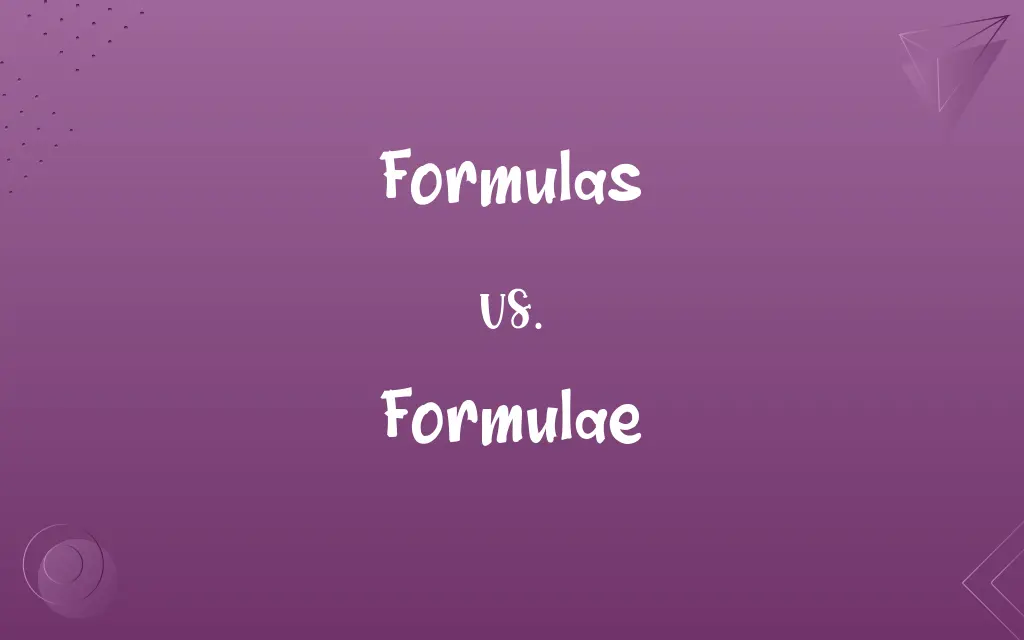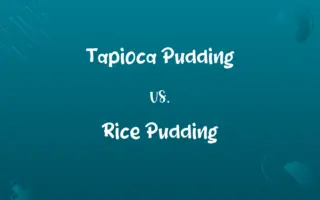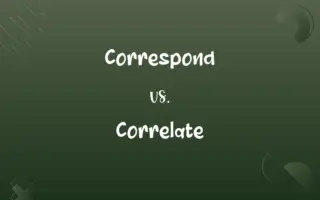Formulas vs. Formulae: Know the Difference

By Shumaila Saeed || Published on February 8, 2024
"Formulas" and "Formulae" are both plural forms of "formula," with "formulas" being more common in American English and "formulae" in British English.

Key Differences
"Formulas" is the plural form of "formula" predominantly used in American English. It signifies a set of rules or principles, often in a scientific or mathematical context. "Formulae," on the other hand, is the traditional Latin plural, used more commonly in British English, maintaining the original Latin root.
Shumaila Saeed
Feb 08, 2024
In academic and professional settings, "formulas" is widely accepted in American publications and discourse. This usage reflects a general trend in American English to simplify linguistic structures. Conversely, "formulae" is often preferred in classical and academic contexts in British English, reflecting a tendency to preserve traditional forms.
Shumaila Saeed
Feb 08, 2024
The usage of "formulas" can be observed in modern textbooks, scientific articles, and general media in the United States. It aligns with the American English practice of streamlining language. "Formulae," however, is frequently found in British literature and scholarly works, especially where Latin terms are prevalent.
Shumaila Saeed
Feb 08, 2024
"Formulas" resonates with a contemporary, simplified approach to language, making it more accessible to a broader audience. "Formulae," with its classical roots, often appears in historical, philosophical, or traditional scientific texts, emphasizing a connection to the linguistic past.
Shumaila Saeed
Feb 08, 2024
In summary, while "formulas" is more common in American English, reflecting a modern and simplified approach, "formulae" is preferred in British English contexts that emphasize traditional linguistic heritage and in academic circles that retain a strong connection to Latin terminology.
Shumaila Saeed
Feb 08, 2024
ADVERTISEMENT
Comparison Chart
Regional Usage
Predominantly used in American English
Commonly used in British English
Shumaila Saeed
Feb 08, 2024
Linguistic Origin
Modern, simplified English form
Traditional Latin plural form
Shumaila Saeed
Feb 08, 2024
Common Contexts
Scientific, educational, and media in the USA
Academic and classical contexts in the UK
Shumaila Saeed
Feb 08, 2024
Linguistic Trend
Reflects American English’s trend towards simplification
Indicates preservation of traditional forms
Shumaila Saeed
Feb 08, 2024
Examples
"The physics book contains various formulas for energy."
"In her thesis, she referenced several mathematical formulae."
Shumaila Saeed
Feb 08, 2024
ADVERTISEMENT
Formulas and Formulae Definitions
Formulas
A fixed form of words, especially one used in particular contexts.
The lawyer used legal formulas in the contract.
Shumaila Saeed
Jan 14, 2024
Formulae
Established forms or templates, especially in artistic or creative works.
The artist experimented with different formulae in her paintings.
Shumaila Saeed
Jan 14, 2024
Formulas
A set of rules or principles, often in mathematics or science.
The chemist explained the formulas for different chemical compounds.
Shumaila Saeed
Jan 14, 2024
Formulae
Specific methods or procedures for doing something.
The book on leadership contained various formulae for effective management.
Shumaila Saeed
Jan 14, 2024
Formulas
A prescribed or set form, especially in ceremonial contexts.
The priest recited the traditional formulas during the ceremony.
Shumaila Saeed
Jan 14, 2024
ADVERTISEMENT
Formulae
Conventional or set forms of words used in ceremonies or rituals.
Ancient texts often include traditional formulae for rituals.
Shumaila Saeed
Jan 14, 2024
Formulas
A method or procedure for achieving something.
His formulas for success were surprisingly simple.
Shumaila Saeed
Jan 14, 2024
Formulae
A set of mathematical or scientific rules or principles.
The professor discussed different mathematical formulae in the lecture.
Shumaila Saeed
Jan 14, 2024
Formulas
An established form of words or symbols for use in a ceremony or procedure.
Shumaila Saeed
Jan 14, 2024
Formulae
An established form of words or symbols for use in a ceremony or procedure.
Shumaila Saeed
Jan 14, 2024
Formulas
An utterance of conventional notions or beliefs; a hackneyed expression.
Shumaila Saeed
Jan 14, 2024
Formulae
An utterance of conventional notions or beliefs; a hackneyed expression.
Shumaila Saeed
Jan 14, 2024
Formulas
A method of doing or treating something that relies on an established, uncontroversial model or approach
A new situation comedy that simply uses an old formula.
Shumaila Saeed
Jan 14, 2024
Formulae
A method of doing or treating something that relies on an established, uncontroversial model or approach
A new situation comedy that simply uses an old formula.
Shumaila Saeed
Jan 14, 2024
Formulas
A symbolic representation of the composition or of the composition and structure of a compound.
Shumaila Saeed
Jan 14, 2024
Formulae
A symbolic representation of the composition or of the composition and structure of a compound.
Shumaila Saeed
Jan 14, 2024
Formulas
A liquid food for infants, containing most of the nutrients in human milk.
Shumaila Saeed
Jan 14, 2024
Formulae
A liquid food for infants, containing most of the nutrients in human milk.
Shumaila Saeed
Jan 14, 2024
Formulas
(Mathematics) A statement, especially an equation, of a fact, rule, principle, or other logical relation.
Shumaila Saeed
Jan 14, 2024
Formulae
(Mathematics) A statement, especially an equation, of a fact, rule, principle, or other logical relation.
Shumaila Saeed
Jan 14, 2024
Formulas
Formula(Sports) A set of specifications, including engine displacement, fuel capacity, and weight, that determine a class of racing car.
Shumaila Saeed
Jan 14, 2024
Formulae
Formula(Sports) A set of specifications, including engine displacement, fuel capacity, and weight, that determine a class of racing car.
Shumaila Saeed
Jan 14, 2024
Formulae
Lists of ingredients or components, especially in a scientific context.
Her research focused on formulae for medicinal compounds.
Shumaila Saeed
Jan 14, 2024
Formulas
A list of ingredients for or constituents of something.
The cookbook included formulas for various sauces.
Shumaila Saeed
Jan 14, 2024
Repeatedly Asked Queries
Are "formulas" and "formulae" interchangeable?
Yes, they are interchangeable but their usage depends on regional preferences—American (formulas) vs. British English (formulae).
Shumaila Saeed
Feb 08, 2024
Where is "formulae" more common?
"Formulae" is more common in British English, especially in classical, academic, and traditional scientific settings.
Shumaila Saeed
Feb 08, 2024
What is "formulae"?
"Formulae" is the traditional Latin plural form of "formula," frequently used in British English and academic contexts.
Shumaila Saeed
Feb 08, 2024
What is "formulas"?
"Formulas" is the plural form of "formula," commonly used in American English for multiple sets of rules or principles, especially in science or math.
Shumaila Saeed
Feb 08, 2024
Where is "formulas" primarily used?
"Formulas" is predominantly used in American English, in scientific, educational, and general media contexts.
Shumaila Saeed
Feb 08, 2024
Do "formulas" and "formulae" have the same meaning?
Yes, both words have the same meaning and refer to the plural of "formula."
Shumaila Saeed
Feb 08, 2024
Is one form more correct than the other?
Neither is more correct; it depends on the regional language preference and context.
Shumaila Saeed
Feb 08, 2024
Which industries commonly use "formulas"?
"Formulas" is commonly used in industries like chemistry, physics, mathematics, and even in culinary arts.
Shumaila Saeed
Feb 08, 2024
Can "formulas" be used in academic writing?
Yes, "formulas" is widely accepted in academic writing, particularly in American English.
Shumaila Saeed
Feb 08, 2024
Is "formulae" outdated?
No, "formulae" is not outdated; it's still used, especially in contexts that retain a strong connection to Latin terminology.
Shumaila Saeed
Feb 08, 2024
Can "formulas" be used in British English?
Yes, "formulas" can be used in British English, but "formulae" is more traditional.
Shumaila Saeed
Feb 08, 2024
Is "formulae" more formal than "formulas"?
"Formulae" can be considered more formal or traditional, especially in academic circles.
Shumaila Saeed
Feb 08, 2024
Are "formulas" and "formulae" used differently in education?
Yes, their usage can vary in educational materials based on regional language standards, with "formulas" common in the U.S. and "formulae" in British or classical education systems.
Shumaila Saeed
Feb 08, 2024
In what contexts is "formulae" preferred?
"Formulae" is preferred in scholarly, historical, and classical contexts, particularly in the UK.
Shumaila Saeed
Feb 08, 2024
Do scientific journals prefer "formulas" or "formulae"?
The preference varies; American journals tend to use "formulas," while European or British journals may prefer "formulae."
Shumaila Saeed
Feb 08, 2024
Why do some people still use "formulae"?
Some people use "formulae" to maintain a connection to the word's Latin roots or due to traditional academic conventions.
Shumaila Saeed
Feb 08, 2024
Does the field of mathematics use "formulas" or "formulae"?
Both "formulas" and "formulae" are used in mathematics, depending on the regional language conventions of the authors or publishers.
Shumaila Saeed
Feb 08, 2024
Is the usage of "formulas" a modern trend?
Yes, the usage of "formulas" reflects a modern trend in American English towards linguistic simplification.
Shumaila Saeed
Feb 08, 2024
Are there differences in pronunciation between "formulas" and "formulae"?
Yes, there are slight pronunciation differences, with "formulae" often pronounced with an emphasis on the 'ae' ending.
Shumaila Saeed
Feb 08, 2024
How has the use of "formulas" evolved over time?
The use of "formulas" has become more prevalent, particularly in American English, as a reflection of linguistic evolution and simplification.
Shumaila Saeed
Feb 08, 2024
Share this page
Link for your blog / website
HTML
Link to share via messenger
About Author
Written by
Shumaila SaeedShumaila Saeed, an expert content creator with 6 years of experience, specializes in distilling complex topics into easily digestible comparisons, shining a light on the nuances that both inform and educate readers with clarity and accuracy.



































































